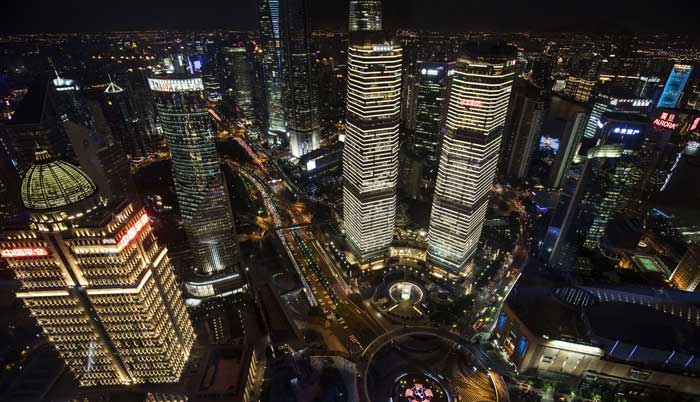![]() Home > World Business
Home > World Business
China's Risk Crackdown Is Giving Giant Bank Stocks a Big Boost

Photographer: Qilai Shen/Bloomberg
![]() January 30th, 2018 | 09:56 AM |
January 30th, 2018 | 09:56 AM | ![]() 1128 views
1128 views
CHINA
China’s top banks -- the biggest in the world -- traded below the value of their assets on concern over rising bad debt and falling profitability. That’s starting to change, and quickly.
A recent surge in the Hong Kong-traded shares of China’s Big Four state banks has lifted their average price-to-book value ratio to 0.99, the highest since an equity boom ended in 2015. China Construction Bank Corp. and Industrial & Commercial Bank of China Ltd. are now back above the value of their net assets.
The turnaround reflects optimism that President Xi Jinping’s deleveraging drive will reduce financial risks at a time when rising interest rates are boosting profits. Monthly new yuan loans reached a record last year and the non-performing loan ratio has stabilized.
"The fact the policy makers seem to be much more convinced about deleveraging and committed toward deleveraging is making the sector more investable again,” said Michael Chang, an analyst at CIMB Securities Ltd. in Hong Kong. “You want to be able to sleep at night. You want to be confident that the sector has a long-term sustainable path.”
There’s no shortage of confidence among investors right now. Banks account for five of the 10 top performers on the H-share benchmark this year, with Agricultural Bank of China Ltd. set for its biggest monthly gain since 2011. Adding to positive sentiment are swelling inflows of capital from mainland investors eager to chase laggards. Even after the rally, the Big Four trade at an average 17 percent discount to their Shanghai-traded shares.
The bull case for Chinese banks centers on recovery. Their net interest margin has been shrinking in recent years owing to gradual interest-rate liberalization, but that’s starting to change. Under the deleveraging campaign, interbank rates have risen, boosting larger banks that tend to be net lenders in that market. Loan-to-deposit ratios have climbed, and so have bond yields.
While deleveraging hasn’t contained overall credit expansion, it’s curtailed key areas of risk: loans to non-bank financial institutions and wealth-management products. Steadier economic growth has also helped reduce credit risks.
“There is a lack of confidence in the book value of the banks given global investor concern on the asset quality issue in China in the past and also the bigger concern on leverage of the market as a whole,” said Felix Lam, a fund manager at BNP Paribas SA’s asset-management arm, which oversees the equivalent of about $708 billion and had positioned for a recovery in these banking shares. “The market is starting to believe that even though there may be issues, the issues are getting addressed.”
Bear Case
Not all bearish concerns have dissipated. Regulators recently penalized Shanghai Pudong Development Bank Co. for hiding non-performing assets. The official non-performing loan ratio across the banking sector was 1.74 percent on Sept. 30, but 80 percent of bank respondents in a 2016 survey said these figures are artificially low.
And based on current trends, China’s debt is still on track to be more than three times the size of the economy by 2022, Bloomberg Economics estimates.
Deleveraging hasn’t floated all boats. Smaller banks have seen weaker rallies, and some such as Bank of Qingdao Co. and Bank of Tianjin Co. have even sold off in the new year, on concern their asset expansion will be curbed by tighter regulations as well as their longstanding disadvantage in attracting deposits.
Raising their price-to-book value ratio above one is especially significant for Chinese banks because they’re only allowed to raise capital at that valuation or higher. Still, major capital-raising plans are unlikely, according to CIMB’s Chang and BNP Paribas’s Lam.
Upcoming Earnings
Whether investors’ optimism is fully justified will be revealed when banks release their full-year earnings starting in late March.
“We are entering into a phase where because of increasing interest rates in the interbank market, there could be a higher likelihood that the net interest margin will go up,” said BNP Paribas’s Lam. “The trend of earnings growth would have a positive kicker if that happens and that would be one of the keys to turning around investor preference for Chinese banks.”
Source:
courtesy of BLOOMBERG
by Justina Lee
If you have any stories or news that you would like to share with the global online community, please feel free to share it with us by contacting us directly at [email protected]